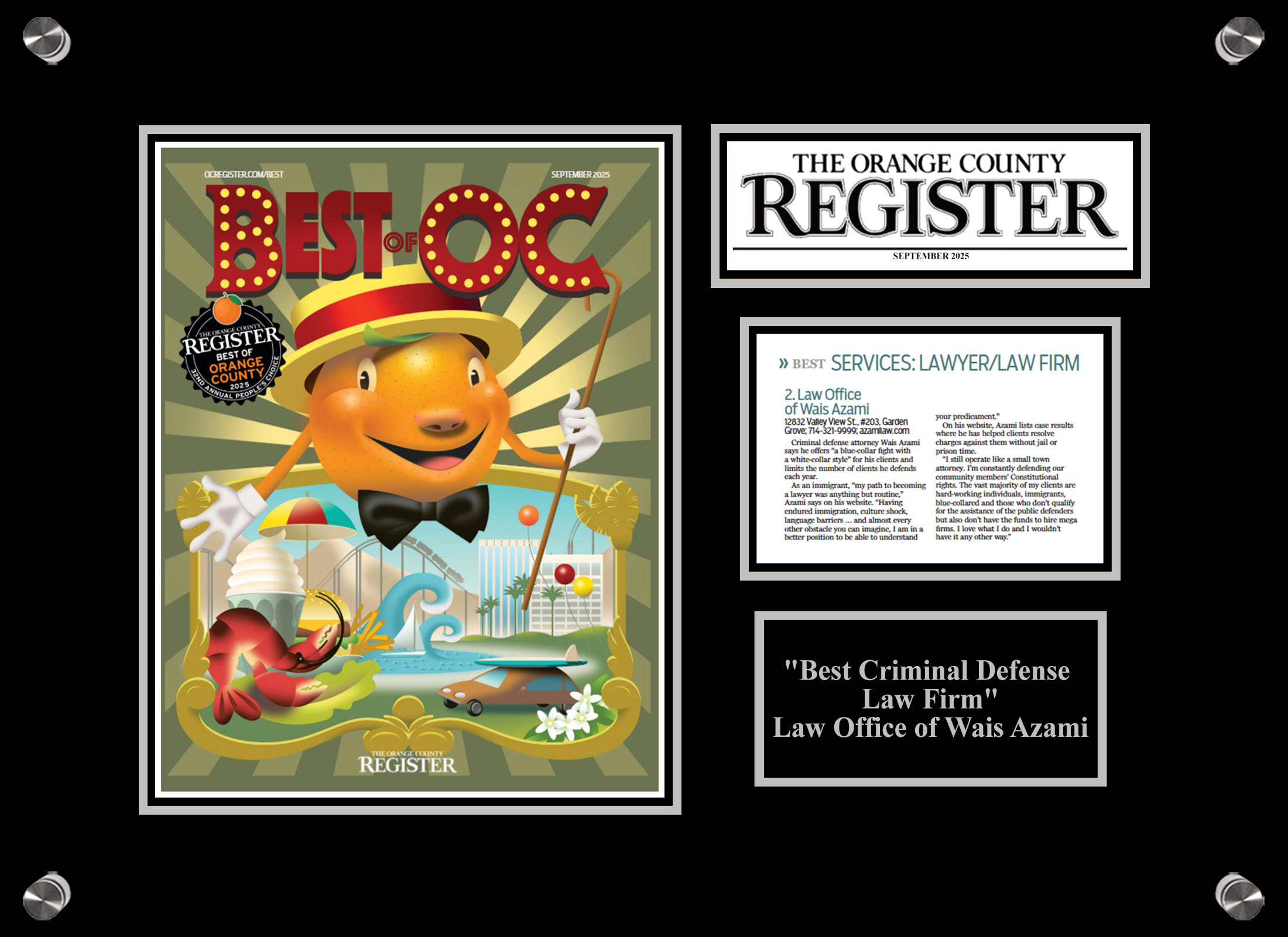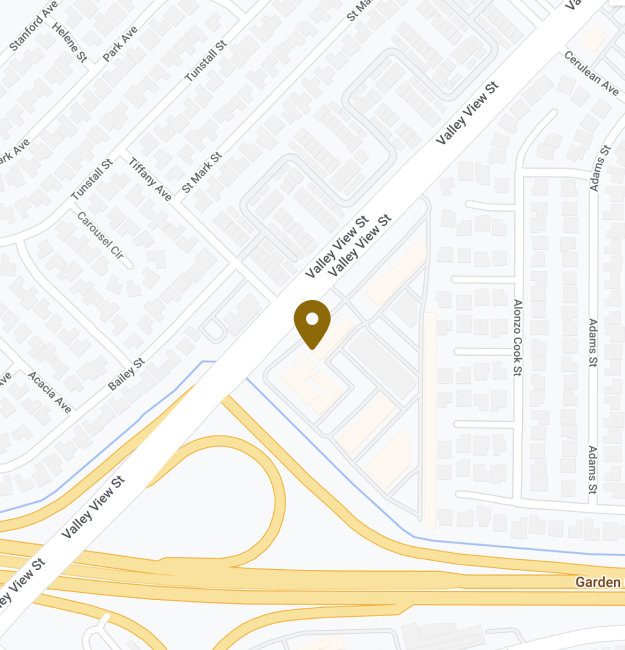Best of OC: Best Lawyer - Law Firm 2024 & 2025
Robbery

Wais Azami is an experienced defense attorney for the charge of robbery. We have successfully defended against such charges and even negotiated a dismissal as part of the plea. What’s the difference between Robbery and Burglary? Burglary is entering a structure to commit a felony of any kind or theft. Robbery is taking the personal property of another from their persons by force, fear, or intimidation. Robbery does not include the element of break-in. Burglary does. But Burglary does not include the presence of a victim/person. Many people assume they are the same thing and use the terms interchangeably, but they are very different!
How does California define robbery under PC 211?
California defines Robbery under Penal Code 211 as:“Robbery is the felonious taking of personal property in the possession of another, from his person or immediate presence, and against his will, accomplished using force or fear.”
What type of robbery is PC 212.5 in California?
California defines robbery of another in certain locations such as ATM’s or of a person who is conducting their job such as a taxi driver in PC 212.5:“(a) Every robbery of any person who is performing his or her duties as an operator of any bus, taxicab, cable car, streetcar, trackless trolley, or another vehicle, including a vehicle operated on stationary rails or on a track or rail suspended in the air, and used for the transportation of persons for hire, every robbery of any passenger which is perpetrated on any of these vehicles, and every robbery which is perpetrated in an inhabited dwelling house, a vessel as defined in Section 21 of the Harbors and Navigation Code which is inhabited and designed for habitation, an inhabited floating home as defined in subdivision (d) of Section 18075.55 of the Health and Safety Code, a trailer coach as defined in the Vehicle Code which is inhabited, or the inhabited portion of any other building is robbery of the first degree.(b) Every robbery of any person while using an automated teller machine or immediately after the person has used an automated teller machine and is in the vicinity of the automated teller machine is robbery of the first degree.(c) All kinds of robbery other than those listed in subdivisions (a) and (b) are of the second degree.”
Are there different types of robberies?
Yes, there are several types of robberies with varying penalties:
- PC 211 Felony Second-Degree Robbery–defined above as taking property from another by force, fear, or intimidation.
- PC 212.5 (a) First-Degree Robbery–if the taking is from a person inside a structure or if the person is performing their duty as an operator of a form of transportation.
- PC 212 (c) Second-Degree Robbery–the robbery was the site of an ATM.
- PC 213(b) Attempted Robbery–this is the same as above but the person robbing didn’t complete the crime.
What are the defenses to the charge of Robbery under PC 211?
- The person willingly gave you the property in question–wasn’t taken by force, fear, or intimidation.
- You were not the one who committed the robbery–mistaken identity.
- You honestly believed you had the right to the property taken–you were reclaiming your property.
Is robbery a misdemeanor or felony?
Robbery of any kind is a felony! This is because the crimes taking another person’s personal property from them through force, fear, or intimidation. Because a victim could potentially fight back or the person committing the robbery may not want to be identified later, it is highly likely death or serious injuries could result. Due to this fact, robbery is deemed a serious and violent felony qualifying as a strike crime.
Does robbery cause a strike on my record?
Yes, Robbery is a strike offense!
What are the penalties for the robbery charge under PC 211?
PC 211 Felony Second-Degree Robbery Penalties :
- Two, three, or five years in prison.
- Zero days to one year with probation.
- Strike and 3rd strike eligible.
- A crime of moral turpitude with potential immigration consequences.
- Ineligible for firearms, voting, public office, and jury service.
- DNA sample requirement.
PC 212.5 (a) First-Degree Robbery Penalties:
- Three, four, or six years in prison
- Zero days to one year with probation
- Strike and 3rd strike eligible.
- A crime of moral turpitude with potential immigration consequences. A crime of moral turpitude with potential immigration consequences.
- Ineligible for firearms, voting, public office, and jury service.
- DNA sample requirement.
Penalties for PC 212 (c) Second-Degree Robbery:
- Three, four, or six years in prison
- Zero days to one year with probation
- Strike and 3rd strike eligible.
- A crime of moral turpitude with potential immigration consequences.
- Ineligible for firearms, voting, public office, and jury service.
- DNA sample requirement.
Penalties for PC 213(b) Attempted Robbery:
- Three, four, or six years in prison
- Zero days to one year with probation
- Strike and 3rd strike eligible.
- A crime of moral turpitude with potential immigration consequences.
- Ineligible for firearms, voting, public office, and jury service.
- DNA sample requirement.
Does an arrest for robbery affect my immigration status?
Yes, Robbery is a crime of moral turpitude, a serious crime, a strike crime, and an aggravated felony. All of these qualify it as a removable or deportable crime for immigrants who are non-citizens.
Should I get an attorney to help me fight charges of robbery?
Absolutely! This is a strike offense, a serious felony, and a violent felony. It doesn’t get much heavier than this charge with such penalties. I urge you to at least consult with an experienced criminal defense attorney such as myself. The price of your defense when facing such charges should only be a small consideration.
Have you been accused of robbery?
Call the Law Offices of Wais Azami at (714) 321-9999. Or schedule a *free consultation with our robbery lawyer in Orange County here. We will generate a defense plan which aims to get the charges dismissed, reduced, and/or the consequences mitigated.














